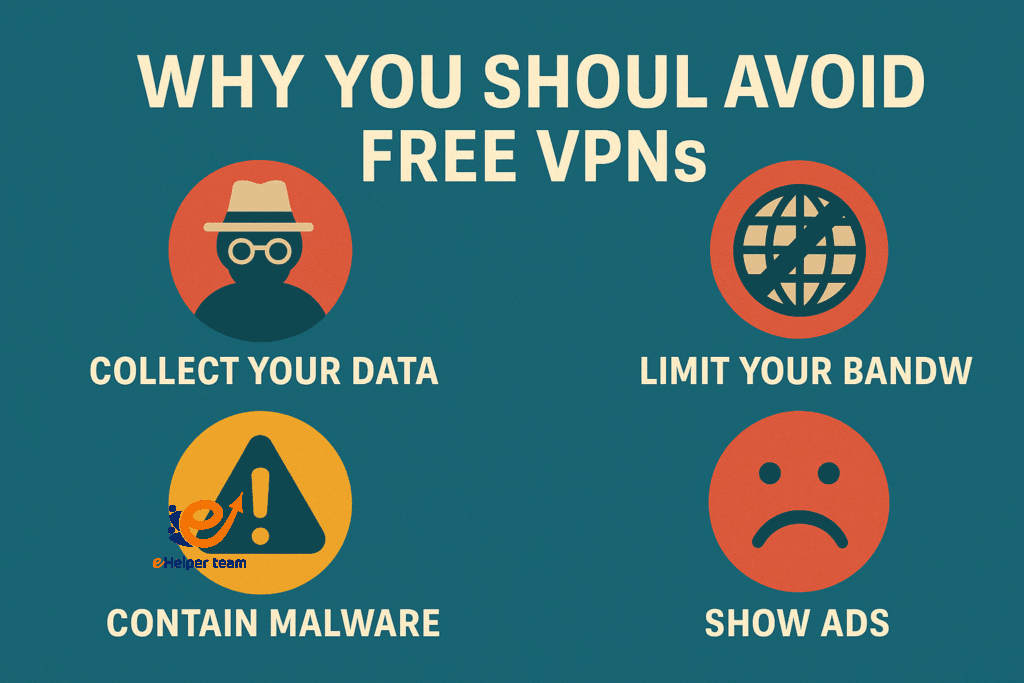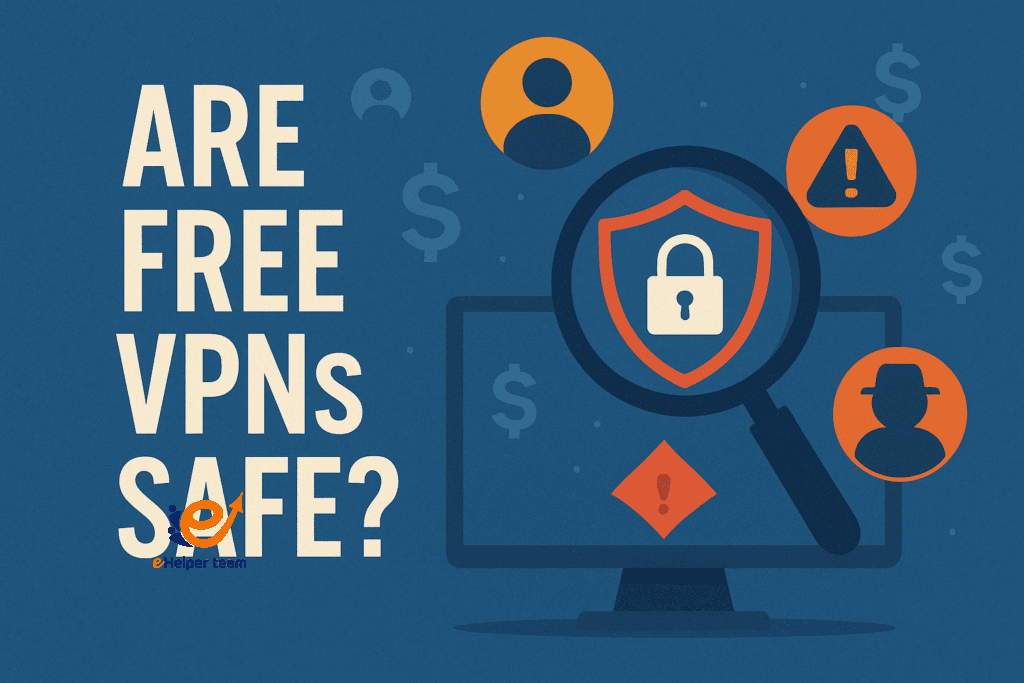Are Free VPNs Safe The Hidden Dangers You Need to Know
Are free VPNs safe, or are they quietly turning your privacy into a product? Millions of users rely on free VPNs to secure their browsing, but behind the curtain, some of these services are compromising your online identity in ways you’d never expect.
The truth is, many free VPNs cut corners. They lack strong encryption, collect your data, or even leak your IP address. One of the most common and dangerous issues? DNS leaks—a vulnerability that can reveal your real location despite using a VPN. You can see how your VPN performs using this DNS leak test tool, and you might be surprised by the results.
In this guide, we’ll walk you through the risks of using free VPNs, why security experts avoid them, and what safer, affordable options are out there for smarter protection.

What Is a VPN and Why Do People Use It?
A VPN (Virtual Private Network) encrypts your connection and masks your IP address, allowing you to:
Bypass regional content restrictions (e.g., Netflix libraries)
Use public Wi-Fi securely
Hide browsing activity from ISPs and advertisers
But while the idea is great, not all VPNs—especially free ones—can truly deliver on these promises.
Are Free VPNs Safe? A Closer Look
Here’s the hard truth: are free VPNs safe? In most cases, absolutely not. While they offer “free” services, the cost is your privacy.
Common issues with free VPNs include:
Weak encryption or no encryption at all
Frequent disconnections and IP leaks
Hidden data tracking scripts
No customer support
How Free VPNs Make Money (At Your Expense)
Running a VPN isn’t free—servers, developers, and infrastructure all cost money. So how do free providers pay the bills?
Selling your data to advertisers or third parties
Injecting ads into your browser experience
Tracking your browsing to build user profiles
It’s a trade: you get a free tool, and they get your personal information.
Common Risks of Free VPNs
You might think using a free VPN is harmless. But here are the actual dangers:
DNS leaks that reveal your true IP
Malware infections through shady apps
Slow speeds and data caps
False “no-logs” policies
Free VPNs often offer a false sense of security, which can be worse than having none at all
Real Privacy Issues You Can’t Ignore
The phrase “no-logs policy” is often thrown around. But many free VPNs:
Track and store logs
Collect metadata (when you connect, for how long)
Share data with partners
And these policies are often buried in vague legal language.
Free VPN Exposes User Data
A popular free VPN exposed user logs on an unsecured server—revealing:
Real IP addresses
Browsing activity
Email addresses
Incidents like this show the true cost of using a service that’s not designed to protect you.
Best Cheap VPN Alternatives
Not ready to spend big? Good news—some of the best cheap VPN options are both secure and budget-friendly.
Look for services that include:
AES-256 encryption
No-logs policies
Global servers
Kill switch features
We recommend exploring HIDE VPN—a fast, reliable VPN that protects without draining your wallet.
ProtonVPN Free Review
ProtonVPN is one of the few reputable free VPNs, offering:
No ads
No logs
High-grade encryption
But its free version has limitations like:
Limited server access
Slower speeds
No streaming support
Use it for light browsing—but consider an upgrade for full functionality.
How Secure Is It?
Windscribe is another trusted name offering:
10GB monthly data
Secure servers
Flexible privacy options
Its free tier is decent, but unlocking the best performance requires a paid plan.
Why Cybersecurity Pros Avoid Free VPNs
Cybersecurity experts generally avoid free VPNs because of:
Lack of transparency
No third-party audits
Questionable ownership
High risk of data harvesting and privacy breaches
The general rule is: if you’re not paying for the product, you are the product.
How to Test If Your VPN Works
Worried your VPN isn’t doing its job? Try:
DNS leak tests
IP leak detection
WebRTC test tools
These tools help confirm whether your connection is secure or vulnerable to exposure.
What to Look For in a Reliable VPN
Choose a provider that offers:
Audited no-logs policies
Modern encryption protocols (WireGuard, OpenVPN)
DNS and IP leak protection
Multi-device support
Trust and transparency are non-negotiable.
Free VPN vs Paid VPN: A Clear Comparison
| Feature | Free VPN | Paid VPN |
|---|---|---|
| Encryption | Often weak or outdated | Military-grade (AES-256) |
| Server Locations | Limited | Global coverage |
| Data Privacy | Often compromised | Zero-logs, independently audited |
| Streaming Access | Rare | Guaranteed on many platforms |
| Support | Nonexistent | 24/7 live support |
If you’re looking for something fast, private, and proven—consider Hide Expert VPN. It offers:
AES-256 encryption
Strong global server network
No logs
Great performance for streaming and torrenting
Explore Hide Expert VPN — Fast, Secure and Private Browsing.
Are Free VPNs Safe? Think Twice Before You Click “Connect”
Before you assume that free VPNs are a safe shortcut to online privacy, pause and reconsider: are free VPNs safe, or are they quietly endangering your digital life?
Here’s a chilling reality most users overlook:
Your personal data could be logged and sold without your consent
DNS and IP leaks might expose your identity even with the VPN “on”
Malicious code or ad-injection might be running in the background
Public Wi-Fi becomes a bigger threat when paired with unverified VPNs
Vague “no-logs” policies often mean the opposite
No customer support if things go wrong
And in extreme cases, you could fall victim to network surveillance techniques
How Free VPNs Affect Your Device’s Performance
While privacy is the main concern for most VPN users, there’s another downside to free VPNs that often goes unnoticed: device performance degradation.
Free VPN apps can consume a surprising amount of your system’s resources. Some run heavy background processes, keep persistent connections, or display constant in-app ads that slow down your processor and drain your battery—especially on mobile devices.
Worse still, certain free VPNs behave like bloatware or even spyware, launching automatically at startup and using RAM even when not actively connected. This can:
Reduce battery life dramatically
Cause apps to lag or crash
Increase device temperature
Consume unnecessary mobile data in the background
If you notice your phone or PC running slower after installing a free VPN, this might be why. A secure VPN should operate lightly and efficiently, without taxing your system or running unknown processes.

Frequently Asked Questions (FAQs)
Q: Are free VPNs safe to use for banking?
A: No. Free VPNs often lack encryption or may log your activity, which is risky during sensitive transactions.
Q: Do free VPNs sell my data?
A: Many do. It’s their main business model for generating income.
Q: What’s a good free VPN that’s actually safe?
A: ProtonVPN is decent, but it has limitations. Paid services are always safer.
Q: How do I know if my VPN is leaking info?
A: Run a DNS leak test or WebRTC test. If your real IP shows up, your VPN is leaking.
Q: What’s the best cheap VPN option?
A: Services like HIDE VPN and Hide Expert VPN combine affordability with strong security features.
Conclusion
Free VPNs are tempting—but the risks far outweigh the benefits. From privacy violations to performance issues, these services often do more harm than good.
Your best move? Invest in a low-cost, reliable VPN that respects your data and prioritizes your security. The peace of mind is worth it.




